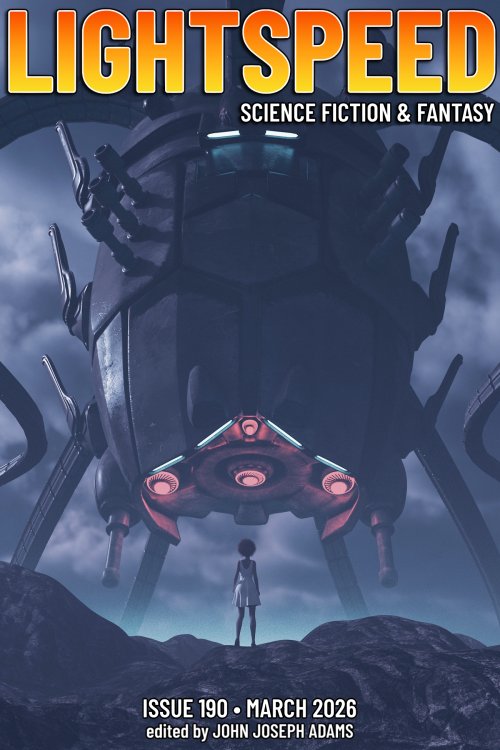Uncanny Vows
Laura Anne Gilman
Trade Paperback / eBook
ISBN: 9781534415966
Saga Press, November 2023, 384 pages
 Greetings, readers, and welcome back to another book review! This month we’re traveling back in time to a vividly reimagined pre-WWI America, stuffed full of eldritch things that go bump in the night while leaving plenty of mysteries to solve, in Uncanny Vows by Laura Anne Gilman.
Greetings, readers, and welcome back to another book review! This month we’re traveling back in time to a vividly reimagined pre-WWI America, stuffed full of eldritch things that go bump in the night while leaving plenty of mysteries to solve, in Uncanny Vows by Laura Anne Gilman.
Uncanny Vows is the sequel to Gilman’s earlier work, Uncanny Times, and continues the adventures of the Harker siblings, Rosemary and Aaron, as they hunt fey creatures (collectively “the uncanny”) across the American Northeast (accompanied, naturally, by their oversized part-hellhound all-good-boy dog, Bother). Both Aaron and Rosemary are Hunters, humans with traces of fey blood in their lineage who use that power to seek out and destroy harmful supernatural threats, but after the incidents of the first book, they’re worried their future with the Hunters may be in peril (a fear caused in no small part due to a dangerous secret they’re hiding from the other Hunters). Tasked with a new mission to appease a wealthy benefactor, Rosemary and Aaron have no choice but to confront the problem at hand while trying to figure out a way forward that still sees them (and Bother) safe—both from the eldritch things they seek as well as the human concerns dogging their shadows.
Let me first say that reading the first book is not necessary to enjoy Uncanny Vows, as Gilman does an excellent job naturally referencing the events therein, though you as a reader will miss out on some nuance if you jump straight into this one. That out of the way, I want to talk about the thing I most enjoyed about Uncanny Vows, which is that this is a book completely unafraid to take its time getting where it wants to go, and is all the better for doing so. It is an exquisitely slow burn following the twists and turns of the Harkers as they work to uncover what is actually going on, and Gilman understands that no amount of excessive action can substitute for the actual horror of a carefully constructed world slowly peeling back its normal-seeming exterior to reveal the alien nature writhing beneath the skin. It’s clear that the 1914 America the Harkers inhabit has been researched to exacting standards, evinced by both the surrounding worldbuilding as well as the dialogue and inner character reflections, and it performs spectacularly as the architecture of the story—a constantly rising violin note that subtly rachets the tension higher and higher, where threats are constantly referenced and imagined, but never quite appear where you expect them to.
The second thing that stood out to me is the relationship between Rosemary and Aaron and how much it enhanced the story. As siblings, the two frequently find themselves at odds with each other even as they’re working toward the same goal, and their constant bickering and subsequent making up felt incredibly life-like (I have a brother, ask me how I know) without detracting from the overall tone of the book. They both make mistakes, get on each other’s nerves, but then find a way to focus and push it aside when serious matters occur, and this relationship does just as much to establish the reality of Gilman’s unreal world as all the careful worldbuilding around them. Even as they occasionally frustrated me, I found myself rooting for the Harkers to succeed against the multitude of forces arrayed against them, which is the sign of excellent character development.
Finally, I would be remiss if I didn’t point out the fact that even though the events in Uncanny Vows take place over a century ago, many of the underlying subthemes are just as relevant today as they were back then. Issues of women’s rights, toxic masculinity, class warfare, and hierarchical group struggles are presented in ways that are both topically relevant in terms of the book’s setting, as well as immediately relevant in our modern world, and, more importantly, in a way that naturally fits the story. It’s always a difficult line to walk when dealing with potentially subversive topics, but Gilman absolutely nails it.
Overall, I feel like Uncanny Vows is one of those perfect books to read as the darker months set in (for those of us in the Northern Hemisphere). The shadows grow longer, the world seems a little less hospitable, but there’s always someone out there fighting to bring some light into areas that desperately need it, and in this case, it’s the Harkers (and best-boy Bother). We may not be able to solve all the mysteries out there, but a lot of times, solving a nearby problem is enough.
Read if: you’re looking for something else to scratch the itch Disco Elysium did; you want some of that old-fashioned eldritch horror without the old-timey racism; you’d pet the dog even if he is part hellhound.
Enjoyed this article? Consider supporting us via one of the following methods:










